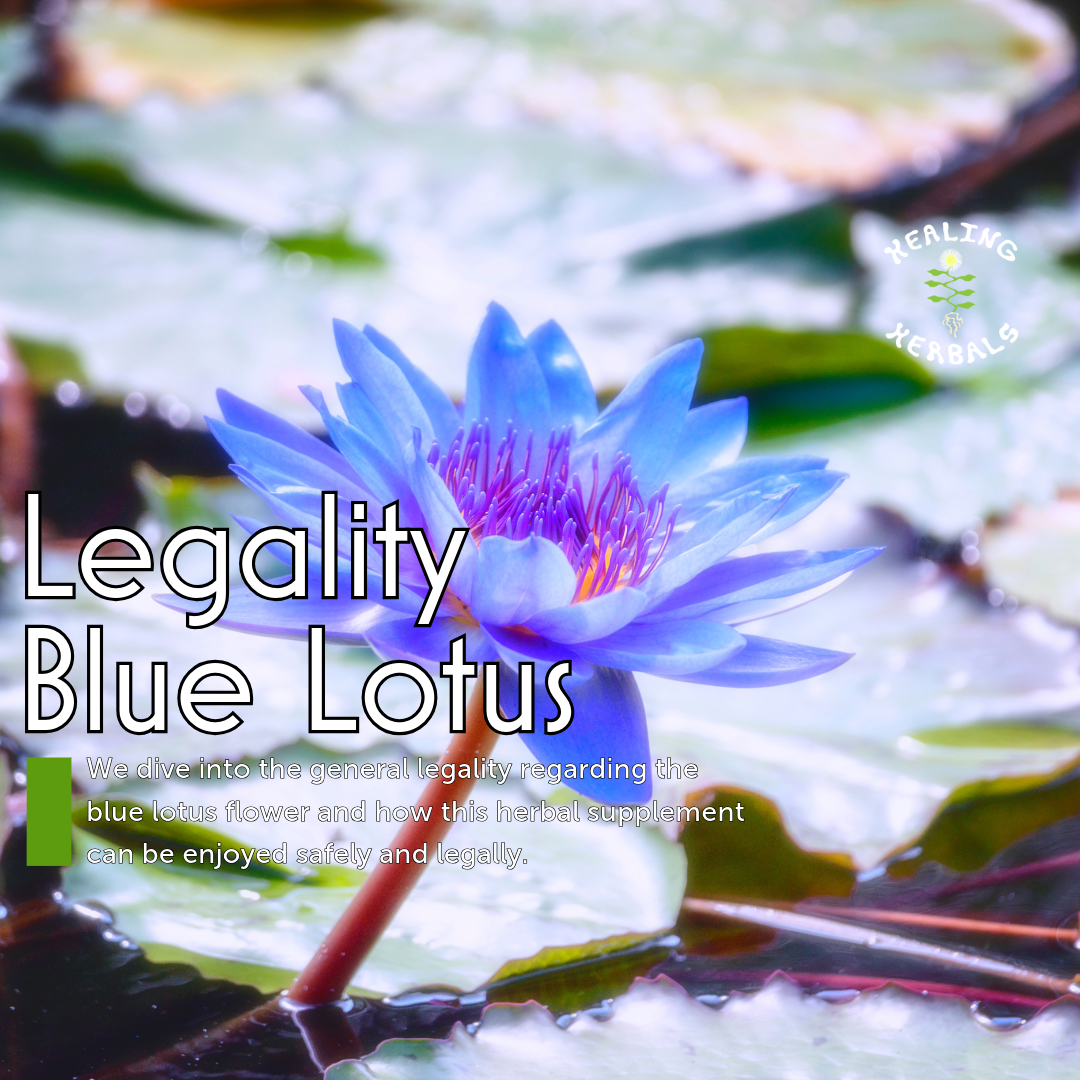
Is Blue Lotus Legal? A general discussion.
Share
Before discussing the legal aspect, let's first address what blue lotus is. Blue lotus, also known as Nymphaea caerulea, is an aquatic flower revered for its mildly psychoactive properties. With a history steeped in ceremonial use, this unique plant has recently gained popularity for its relaxing effects and mild euphoria, drawing curiosity around its legal status. Here, we'll look at the current legal landscape for blue lotus, its uses, and what you should consider if you're interested in this botanical.
What is Blue Lotus and How is it Used?
Blue lotus, often called the “sacred blue lily,” originates from the Nile region and parts of Asia. In ancient Egypt, it was regarded as a powerful symbol of life and rebirth. Today, blue lotus has found its way into herbal wellness circles and is available as tea, tinctures, extracts, and even vape products. Many use blue lotus for benefits like relaxation, sleep enhancement, and a gentle mood lift without the intensity associated with stronger psychoactive substances. Its popularity has naturally raised questions around where and how it can legally be purchased and used.
Is Blue Lotus Legal?
The legal status of blue lotus varies across regions, although it is generally not classified as a controlled substance. Here’s a quick overview:
In the United States, blue lotus is legal in most states and is usually marketed as a supplement or herbal product. The Food and Drug Administration (FDA) has not classified blue lotus as a controlled substance, yet it does not approve it for human consumption. This means that blue lotus is typically sold as “aromatic” or “herbal incense,” and sellers often cannot make any claims about its consumption.
In the European Union, blue lotus is similarly available, though it is not officially regulated for consumption. Certain countries in the EU may impose restrictions on its import or sale if marketed specifically for consumption, so buyers should exercise caution.
In Australia and New Zealand, the rules are a bit tighter. Blue lotus is considered a “herb of concern” in Australia, making it illegal to sell it explicitly for consumption, although it may be imported under certain regulations. New Zealand has some similar restrictions; so, again, it’s best to verify the latest local rules if you’re in that region.
In Canada, blue lotus can legally be purchased and owned, though, as with the U.S., it is not approved for human ingestion.
Why Are There Restrictions on Blue Lotus?
The uncertainty around blue lotus legality is mainly due to a lack of formal regulatory approval. Since it contains psychoactive compounds, regulators like the FDA in the U.S. exercise caution, keeping blue lotus from being classified as a food or ingestible product. Without standardized studies affirming its safety for consumption, blue lotus is often restricted from being marketed as an ingestible item, leading to its sale primarily as an aromatic or ornamental product.
Considerations Before Buying Blue Lotus
If you're interested in trying blue lotus, here are some important tips. First, always check local regulations, as laws can vary widely. In many areas, blue lotus is legal, but it's still best to confirm whether there are specific restrictions. Additionally, sellers are often not allowed to advise on its use for consumption, so you’ll typically find blue lotus marketed for non-consumable purposes. Finally, because blue lotus is not FDA-regulated, quality can differ greatly. Seek out reputable sources to ensure you're getting a high-quality product, as this can affect your experience.
The Future of Blue Lotus Legal Status
As interest grows in herbal products for relaxation and wellness, blue lotus may one day receive a clearer regulatory classification. Ongoing scientific curiosity around natural compounds has led to increased studies, which could eventually expand blue lotus's legal uses. For now, however, it remains a legal, intriguing option for natural relaxation in many parts of the world, as long as it is sold and used in line with current regulations.
Final Thoughts
Blue lotus stands out as a botanical that bridges the gap between ancient practices and modern wellness. While its legal status may seem unclear in some areas, its availability in most regions makes it an accessible option for those looking to try a natural relaxation aid. When purchasing, remember to check local laws, choose a reputable supplier, and stay aware of current guidelines to enjoy blue lotus responsibly and legally.**
For a trusted source of blue lotus visit https://healingherbals.store/products/blue-lotus-loose-leaf-tea
**This information is for educational purposes and is not medical advice. Consult a healthcare provider before using blue lotus, especially if pregnant, nursing, or taking medications. Blue lotus is not FDA-approved for human consumption; use at your own risk and follow local laws.
